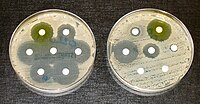
Photo from wikipedia
ABSTRACT Introduction Antimicrobial resistance (AMR) is a major threat to global health requiring continuous development of new antimicrobial agents. Antimicrobial research and development (R&D) should be promoted in the pharmaceutical… Click to show full abstract
ABSTRACT Introduction Antimicrobial resistance (AMR) is a major threat to global health requiring continuous development of new antimicrobial agents. Antimicrobial research and development (R&D) should be promoted in the pharmaceutical industry and academia to ensure sustainable patient access to new treatment options and reduce the global AMR burden. Areas covered This review describes the historical challenges in novel antimicrobial drug development in Japan, current national efforts to promote the development, and proposals to effectively manage future AMR pandemics. Literature searches were performed in the PubMed database (from inception to January 2022). Expert opinion R&D activities in the antimicrobial space in Japan have been insufficient due to multiple factors, including unfavorable cost-profit balance and differences in regulatory requirements between Japan and Western countries. However, the situation is improving with the implementation of the Japanese AMR action plan, drug R&D programs led by the Japan Agency for Medical Research and Development, and efforts of regulatory agencies in the United States, Europe, and Japan in aligning and expediting the clinical development process. Further actions during the interpandemic period will strengthen antimicrobial R&D, including international and interdisciplinary collaboration, continued funding and investment with the national government’s leadership, and fostering of new-generation academic research leaders. PLAINLANGUAGE SUMMARY Every year, many people suffer and die of antimicrobial-resistant infections worldwide. New treatment options are required to tackle antimicrobial-resistant infections; however, pharmaceutical companies have not been very active in developing antimicrobial agents in the last two decades. This was mainly due to the difficulty in discovering new and effective compounds and insufficient funds being spent on drug discovery. In addition, differences in drug development requirements between the United States (US), Europe, and Japan have made it difficult for Japanese pharmaceutical companies to develop antimicrobial agents that can be used in all regions in a timely manner. In the last decade, several measures have been taken to re-activate antimicrobial research and development in the pharmaceutical industry, as well as in academia, in Japan. These measures include a national action plan to combat antimicrobial-resistant infections and research support programs led by the Japan Agency for Medical Research and Development. Regulatory authorities in the US, Europe, and Japan have initiated efforts to expedite the development of drugs to treat infections. Moreover, pathways for accelerated regulatory review have been established to reduce the time taken for new drugs to be approved, and this has already been applied to several new anti-infective drugs. To combat the coronavirus disease 2019 (COVID-19) pandemic, the development of novel vaccines and antiviral drugs has been accelerated with unprecedented speed. Additional actions, such as international research collaboration programs and investment in new antimicrobial development, may help promote antimicrobial research and development activities in Japan.
Journal Title: Expert Review of Anti-infective Therapy
Year Published: 2022
Link to full text (if available)
Share on Social Media: Sign Up to like & get
recommendations!